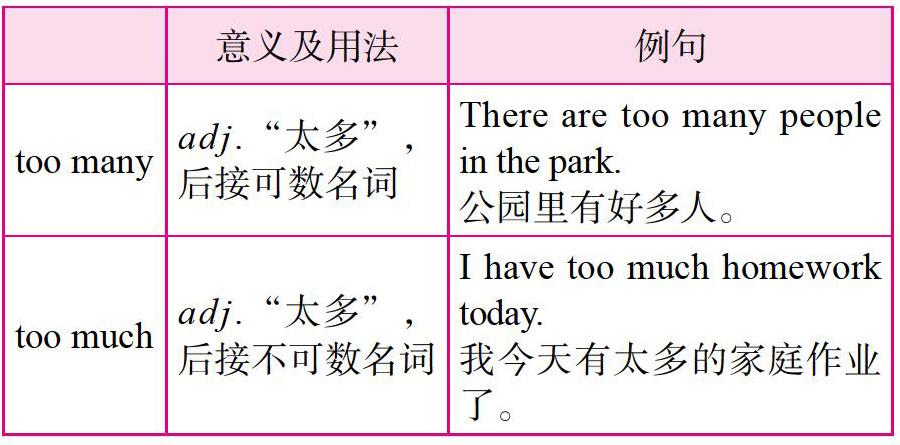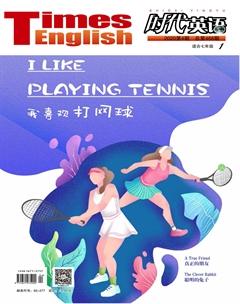Unit 4 Don’t eat in class.


Section A
1. Dont arrive late for class. You must be on time.
上课别迟到,你必须准时。
(1)arrive v. 到达
You must arrive at the airport two hours early.
你必须提前两小时到达机场。
① arrive in + 大地点
We arrived in Beijing by plane.
我们乘飞机到北京。
② arrive at + 小地点
He arrives at school at seven oclock.
他七点钟到校。
(2)arrive late for = be late for 迟到
(3)on time“准时,按时”,指按规定的时刻不早不晚;in time“及时”,指没有迟到,时间还充裕。
Hell certainly be here on time.
他保证按时到。
Can we get to the station in time?
我们能及时到达车站吗?
2. Dont listen to music in class.
不要在课堂上听音乐。
hear,listen和sound都有“听”的意思,但三者是有区别的:
(1)hear“听说”,侧重于听的结果。
Im sorry to hear that you are ill.
听说你生病了,我很难过。
(2)listen“听”,侧重于听的过程。
listen to music/the radio 听音乐/广播
Listen to me carefully.
仔细听我说。
(3)sound link v. “听起来”,后面接形容词。
It sounds great.
这听起来很棒。
3. Dont fight.
不要打架。
fight v. 打架;战斗
(1)fight for“为……而战斗”,后面常接抽象名词,表示为事业、自由等而战斗。
They are fighting for freedom.
他们正为自由而战。
(2)fight against“为反对……而战斗”,后接事物名词、人和国家名词。
They fight against the enemy.
他们和敌人作战。
(3)fight with“和……打架;同……(并肩)战斗”,后只接表示人或国家的名词。
Dont fight with him.
不要和他打架。
4. Can we bring music players to school?
我们可以把音乐播放器带到学校吗?
bring v.“带来;取来”,指把东西从别处带到说话地。
Bring your homework here tomorrow, please.
请你明天把你的作业带来。
take v.“带走,拿走”,指把东西从说话地带到别的地方。
Can you help me (to) take the books to the classroom?
你可以帮我把这些书带到教室去吗?
5. Can we wear a hat in class?
我们可以在课堂上戴帽子吗?
wear v. 穿;戴
Tony wears a T-shirt.
托尼穿着一件T恤。
比较:wear和put on
wear和put on均有“穿”的意思,但wear指“穿着”,侧重穿的状态;put on指“穿上”,侧重穿的动作。
Its cold outside. Put on your coat.
外面冷,穿上你的外套。
GRAMMAR FOcuS
祈使句的用法
(1)祈使句是指用來表示请求、命令、建议等的句子。在祈使句中,通常省略主语you,谓语动词用原形。句末一般用句号,表示较强语气时,则用感叹号。
Listen to me!
听我说!
Let me have a rest.
让我休息一下。
(2)祈使句表示客气时,通常加 please。please可放在句首,也可放在句末。放在句末时,一般需要用逗号与前面的词隔开。
Please come in. / Come in, please.
请进。
(3)祈使句的否定式是在动词原形前加dont。
Dont run in the street.
不要在街上跑。
Dont smoke here!
不要在这儿吸烟!
情态动词 can,must和have to
(1)情态动词can的用法:
含有情态动词can的一般疑问句用来表示请求许可,应将can置于主语之前,回答时用can/cant。
—Can I have a look?
我可以看一看吗?
—Yes, you can. / No, you cant.
是的,你能。/ 不,你不能。
(2)情态动词must的用法:
表示有做某事的必要或义务,是说话人的主观看法,意为“必须;应该”。 mustnt 常用于否定句中,表示“不允许;禁止”。
I must go now.
我现在得走了。
You mustnt park your car here.
你的车不允许停在这儿。
(3)情态动词have to的用法:
have to表示客观需要做的事情,意为“必须;不得不”。使用have to时应注意:
① have to后接动词原形,意为“必须做……;不得不做……”。
I have to leave.
我不得不离开了。
② have to有人称、数和时态的变化,其第三人称单数形式为has to。
She has to do her homework.
她不得不做家庭作业。
③ 含有have to,has to的句子需分别借助助动词do或does构成疑问句或否定句。
Do they have to get up early?
他们必须早起吗?
He doesnt have to go if he doesnt want to.
如果他不想去,他就不必去。
活学活用
用can, cant, do, dont, have to填空。
1. —What are the rules at your school?
—____ run in the hallway.
2. —____ we eat in school?
—We can eat in the dining hall, but we ____ eat in the classroom.
3. —What else ____ you have to do?
—We ____ clean the classroom.
Section B
1. practice the guitar
练习吉他
practice v. & n. 练习
Dave practices the guitar before dinner.
大卫在晚餐前练习弹吉他。
practice doing sth 练习做某事
He practices playing the piano every day.
他每天练习弹钢琴。
2. There are too many rules!
有太多的规矩了!
(1)there be与have (has)的区别:
There be表示某个地方“存在”某物或某人;而have(has)表示主语“拥有”某人或某物。但如果表示部分与整体的关系時,there be与have(has)这两种表达方式可以互换。
A week has seven days. = There are seven days in a week.
一星期有七天。
(2)too many与too much的区别:
3. I know how you feel.
我明白你的感受。
feel v. 感受;感觉
Youll feel better after a nights sleep.
你晚上睡个好觉就会觉得舒服些。
feel + adj. 感觉……
I feel relaxed every day.
我每天感觉很轻松。
4. Parents and schools are sometimes strict, but
remember, they make rules to help us.
虽然父母和学校有时很严格,但是记住,他
们制定规则是为了帮助我们。
(1)strict adj. 严格的;严厉的
① be strict with sb 对某人严厉
We should be strict with ourselves.
我们应该对自己严格。
② be strict in (doing) sth 对(做)某事要求严格
Our boss is strict in our work.
我们老板对我们的工作要求严格。
(2)remember v. 记得,记住
① remember doing sth 记得做过某事(已做)
I remember seeing him once.
我记得见过他一次。
② remember to do sth 记得要做某事(未做)
Remember to close the door when you leave.
你离开时记得关门。
(3)make rules 制定规则
follow the rules 遵守规则
(4)help sb with sth/ help sb (to) do sth 帮助某人做某事
help oneself (myself/yourself/herself...) to + n. 请随便吃/喝点儿……
Linda often helps her mother (to) do housework.
琳达经常帮她妈妈做家务。
Please help yourselves to some fruit.
请随便吃些水果。
单项选择
( ) 1. —Can we talk about the book in the library?
—___ . We have to be quiet.
A. Yes, we can B. Yes, we do
C. No, we cant D. No, we dont
( ) 2. ___ fighting! The teacher is coming.
A. To stop B. Stopping
C. Stop D. Dont stop
( ) 3. Does she ___ clean the classroom today?
A. has to B. have to
C. has D. have
( ) 4. Our teachers are strict ___ us. We have many rules to follow.
A. with B. in C. on D. to
( ) 5. He cant ___ , but he often ___ to the beach to play.
A. swimming; go B. swim; goes
C. swims; goes D. swim; go
单词拼写
1. Im s_____ that I cant help you this time.
2. Anna wants to l_____ to play the guitar. Can you teach her?
3. I dont clean my room, so it is very d_____.
4. Its very i_____for us to keep healthy.
5. My father is very busy and he has no time to r_____ .
用所给词的适当形式填空
1. Alice usually_____(wear) a red hat.
2. I must do the _____(dish) after dinner.
3. We dont like these_____(rule). They are too strict.
4. Jane never_____ (arrive) late for school.
5._____(listen) to your teacher carefully in class.
按要求完成句子
1. Jim can play basketball on weekends.(改為否定句)
Jim _____basketball on weekends.
2. I want to keep my hair long, too.(改为否定句)
I _____want to keep my hair long,_____ .
3. We cant play sports in the classroom.(改为祈使句)
_____sports in the classroom.
4. My sister can play the piano.(对画线部分提问)
_____ your sister_____?
5. They can eat in the classroom.(改为一般疑问句)
_____in the classroom?
6. 你能在周末外出吗?(完成译句)
Can you _____on the weekend?
7. 我们必须准时到那儿。(完成译句)
We must get there_____ .
8. 别在教室里吵闹。(完成译句)
_____in the classroom.
9. music, listen, to, in, classroom, dont, the(连词成句)
__________.
10. uniform, does, school, wear, at, he, the, have, to(連词成句)
__________?
补全对话
A: We have a lot of rules in our school.
B: _____1
A: Dont eat in the classroom. Dont run in the hallways. Dont listen to music in the classroom._____ 2
B: _____3
A: We can eat in the dining hall, but we cant eat in the classroom.
B: Can we wear hats in school?
A:_____4
B: Do we have to wear uniforms?
A: _____5
B: Oh, there are too many rules.
A. No, we cant.
B. Yes, we have to.
C. What are the rules?
D. Can we eat in school?
E. Dont arrive late for school.
1._____ 2. _____ 3._____ 4. _____ 5. _____
阅读理解
A
Rules are everywhere. When you read in the library, play basketball or drive a car, you have to follow some rules. Rules are important to us. Do you know that you must follow some rules on the plane?
Linda and her friend Carl go to the US by plane. She takes the emergency exit seat (靠近紧急出口的座位). She sees a card in her seat.
If you are in an emergency exit seat, read the rules.
You must
· Be at least (至少) 15 years old and healthy to give help.
· Be able (能够) to speak and read English very well.
You must not
· Take a child (two years old and under).
· Take a pet, like a dog, a bird, etc.
( ) 1. The writer thinks rules are ___ .
A. strict B. terrible C. important D. relaxing
( ) 2. Who is in the emergency exit seat?
A. Linda. B. Carl.
C. Lindas brother. D. Carls brother.
( ) 3. Who can take an emergency exit seat?
A. Jenny, 18, cant see or talk.
B. Michael, 20, is from England.
C. Mr Wang, 40, speaks only Chinese.
D. Tom, 14, takes his sister.
( ) 4. What does the word “pet” mean in Chinese?
A. 行李 B. 宠物 C. 工具 D. 亲属
( ) 5. The passage is about some rules ___ .
A. in the sports hall B. in the library
C. on the train D. on the plane
B
Hong Kong has about forty public beaches (沙滩). Some are very famous in the world. People can go there for a swim. You can go to some beaches by bus. To go to some beaches you must take a boat.
You will swim there without danger (危险) if you remember these instructions (指示):
· Never swim alone.
· Never go out in a boat if you cannot swim.
· Never swim after a meal or when you feel hungry or tired.
· Dont stay in the water too long.
Remember: a red flag means that it is dangerous for anybody to go into the water, and a blue flag means that it is dangerous for children.
根据短文内容,判断正(T)误(F)。
( ) 6. There are about 40 public beaches in Hong Kong.
( ) 7. You should swim after a meal.
( ) 8. You can take a bus to go to some of the public beaches.
( ) 9. You cant swim when youre alone.
( ) 10. A child can swim if there is a blue flag.
完形填空
Do you have family rules? For1 , I have strict family rules. I must2them.
I cant go out or go home late3Monday to Friday. If (如果) I do that, my parents will be not4 . On my school days, I cant5TV or play computer games. I6listen to music when I do my homework. I dont like this rule7music is my favorite. After school every day, I must do my homework first. I also have to get up and go to bed8 . My parents think its good for my 9 . On the weekend I have to10playing the piano for two hours in the morning. But I can go out to do sports with my friends after that.
These rules are strict but useful for me.
( ) 1. A. me B. them C. us D. you
( ) 2. A. like B. follow C. exercise D. make
( ) 3. A. from B. on C. at D. in
( ) 4. A. strict B. easy C. happy D. right
( ) 5. A. see B. read C. watch D. look
( ) 6. A. need B. neednt C. can D. cant
( ) 7. A. and B. because C. but D. so
( ) 8. A. quietly B. quickly C. late D. early
( ) 9. A. school B. time C. health D. habit
( ) 10. A. help B. love C. finish D. practice
選词填空
阅读短文,从方框中选择适当的词,并用其正确形式填空(每词限用一次)。
arrive sorry before talk quiet
fight only make rule strict
Li Hua lives in Beijing. He is not a1boy. He doesnt like to follow the2at school. He thinks the rules are really terrible.
Every Monday morning, he cant3at school on time, because he always watches basketball games on Sunday nights. And he never feels4for it. After class, he likes playing games with his classmates. Sometimes he5with other (其他的) boys in the hallways. His parents know he doesnt perform (表现) well at school, so they are6with him at home. They let him7his bed and do the dishes on weekends.8going to bed, he must read a book. He can9watch TV for an hour every night. Li Hua doesnt like his family rules, either. Sometimes he wants10about the rules with his parents.
1. _____ 2. _____ 3._____ 4. _____ 5._____
6._____ 7._____ 8. _____ 9._____ 10. _____
书面表达
假如你是李明,下面是你们学校的一些规章制度。请你写一封电子邮件,向你的笔友Tom做介绍。内容提示:
1﹒上课不准迟到;2﹒课堂上保持安静;3﹒见到老师要问好;4﹒不许在教室里吃东西;5﹒不许在课堂上听音乐,玩游戏。
注意:词数60左右(开头已给出,不计入总词数)。
Dear Tom,
Thanks for your last letter. You want to know the rules in our school. Now let me tell you about them.
Yours,
Li Ming

